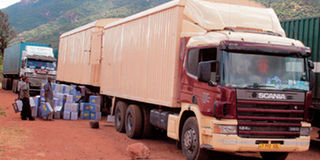Remove trade barriers to woo global market, Africa urged

Trade barriers increase cost of doing business through official and unofficial payments to clear goods at border points. African countries have been urged to lower the cost of trading on the continent by removing the many barriers to trade if they are to increase their share of global market. PHOTO/FILE
What you need to know:
- According to the UN Economic Commission for Africa (ECA) Director of Regional Integration and Trade Division, Mr Stephen Karingi, red tape and other disproportionally high transaction costs make African businesses uncompetitive against their peers in other continents.
- Additionally, full elimination of tariff barriers on goods within Africa accompanied by procedures to ease trade across borders would offer new market opportunities as the tripartite exports to other African partners would substantially increase.
African countries have been urged to lower the cost of trading on the continent by removing the many barriers to trade if they are to increase their share of global market.
According to the UN Economic Commission for Africa (ECA) Director of Regional Integration and Trade Division, Mr Stephen Karingi, red tape and other disproportionally high transaction costs make African businesses uncompetitive against their peers in other continents.
“More than ever, decisive action to cut trade costs represents a key policy priority which could significantly boost global trade, thereby helping the global economy to set in on a strong recovery path,” Mr Karingi said.
Making the remarks recently at the third International Single Window Conference in Antananarivo, Madagascar’s capital, he noted that in 2012, the average African exporter took a week longer to export a standard container and paid Sh35,148 ($404) more compared with their competitors on other continents.
WEEK LONGER TO MPORT
“The same held true with regards to imports. Importing to Africa required on average a week longer and costs as much as Sh58,116 ($668) more,” he said.
Currently, the ECA, through the African Trade Policy Centre, is conducting research on trade facilitation issues with a view to informing Africa’s position on the proposed Trade Facilitation Agreement at the World Trade Organisation.
The ECA estimates that the share of intra-African trade could more than double within the next 10 years if the Continental Free Trade Area is implemented by 2017, along with improvement of customs procedures, port handling and inland transport.
These could further increase efficiencies and enhance trading activities, cutting down costs and making the continent more competitive in the global market.
Additionally, full elimination of tariff barriers on goods within Africa accompanied by procedures to ease trade across borders would offer new market opportunities as the tripartite exports to other African partners would substantially increase.
Already, interventions to create a Tripartite trading bloc comprising the Common Market for Eastern and Southern Africa (COMESA), the East African Community (EAC) and the Southern Africa Development Community (SADC) are poised to reduce tariff barriers within itself and when exporting to the rest of Africa.
FREE TRADE AREA
The three Regional Economic blocs bringing together 26 countries with a population of 527 million and a Gross Domestic Product of Sh54.3 trillion ($624 billion), are committed to establishing a Tripartite Free Trade Area by 2014.
“These would be critical to ensure large benefits in terms of both real income and trade to all tripartite countries as well as for boosting intra-Tripartite trade and its industrialization,” noted ECA’s Deputy Executive Secretary, Abdalla Hamdok.
He noted that the Tripartite area mainly exports to and imports from outside the African continent, with the European Union being the Tripartite’s main trading partner, followed by the United States and emerging economies such as Brazil, Russia, India, China and South Africa.
“This is so, especially in agriculture and food as well as in some industrial sectors,” he said, stressing that the establishment of an effective CFTA would contribute to removing such existing barriers.
However, policy challenges to address infrastructure development issues in the Tripartite region and mobilization of resources, especially domestic resources, encouraging Foreign Direct Investment from emerging economies, accelerating institutional and governance reforms still stand in the way of enhancing trade on the continent.





